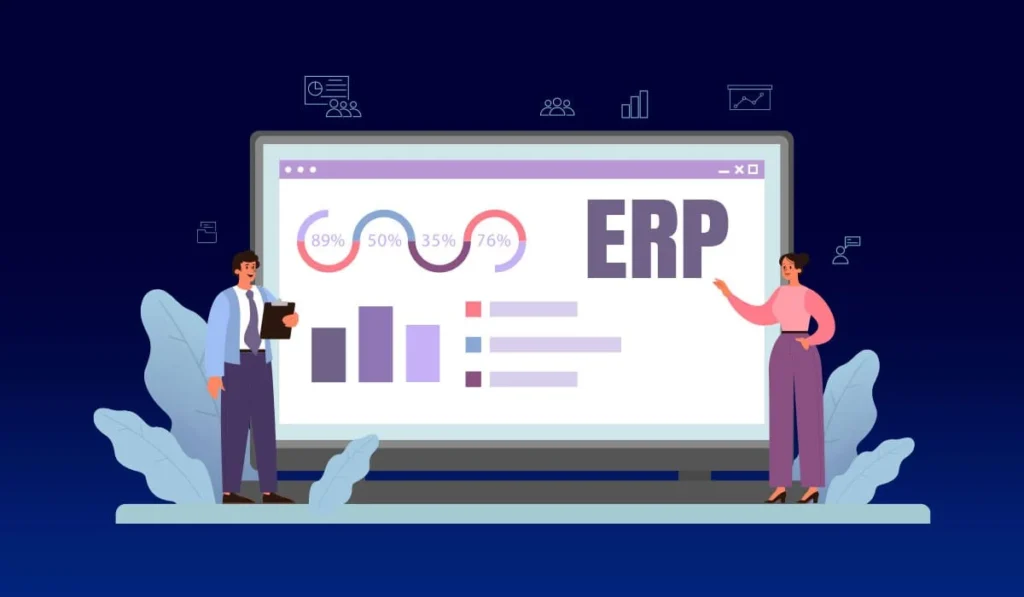In modern business operations, effective supply chain management has become a crucial aspect for companies striving to maintain a competitive edge.

Benefits Of POS In Wholesale And Distribution
In modern business operations, effective supply chain management has become a crucial aspect for companies striving to maintain a competitive edge.
One of the key tools facilitating this complex process is Enterprise Resource Planning (ERP) systems.
ERP for supply chain management plays an important role in streamlining operations, optimizing processes, and enhancing overall efficiency.
This guide explores ERP’s significance in supply chain management, its functions, specific influences on processes, essential features, and broader business impact.
Content Index

ERP systems are integrated software solutions designed to manage various aspects of a business, including accounting, human resources, procurement, inventory, and more.
In supply chain management, ERP serves as a centralized platform that connects different departments and functions within an organization.
It provides real-time visibility into key processes, enables data-driven decision-making, and fosters collaboration across the supply chain network.
The significance of ERP Systems for supply chain management cannot be overstated.
One of its primary benefits is the ability to synchronize and optimize operations, from procurement to production to distribution.
ERP systems contribute to enhanced efficiency, reduced costs, and improved customer satisfaction by automating tasks, providing accurate data insights, and facilitating seamless communication.
These contributions ultimately lead to sustainable business growth.
The ERP systems for Supply Chain Management offer a wide range of functions that contribute significantly to enhancing efficiency, streamlining operations, and improving overall supply chain performance.
The functions of ERP Systems for Supply Chain include:
ERP systems facilitate strategic supply chain planning by providing real-time data, predictive analytics, and scenario modeling tools.
This enables organizations to make informed decisions regarding sourcing, production, distribution, and inventory management.
By aligning supply chain activities with business goals and market demands, companies can enhance agility and responsiveness.
ERP systems streamline procurement processes by automating supplier management, purchase orders, and contract management.
Integration with suppliers’ systems enables seamless communication and collaboration, ensuring timely delivery of materials and components.
Similarly, in fulfillment processes, ERP optimizes order processing, inventory allocation, and shipping, leading to faster order fulfillment and improved customer satisfaction.
Effective inventory management is critical for balancing supply and demand, reducing carrying costs, and minimizing stockouts.
ERP systems offer inventory optimization tools, demand forecasting algorithms, and inventory tracking capabilities.
This helps in maintaining optimal inventory levels, improving inventory turnover ratios, and avoiding excess or obsolete inventory.
ERP systems play a vital role in ensuring on-time delivery and exceptional customer service.
By integrating logistics and transportation management functions, ERP enables route optimization, shipment tracking, and delivery scheduling.
This results in faster order delivery, reduced lead times, and enhanced customer experience, leading to increased customer loyalty and repeat business.
ERP systems provide robust analytics and reporting features for monitoring and evaluating supply chain performance.
Key performance indicators (KPIs) such as order fulfillment rates, inventory turnover, lead times, and supplier performance can be tracked in real time.
This data-driven approach helps in identifying areas for improvement, optimizing processes, and driving continuous performance enhancement initiatives.
ERP systems support ongoing monitoring and maintenance of supply chain processes through alerts, notifications, and exception management tools.
By proactively identifying issues such as supply disruptions, quality issues, or capacity constraints, ERP enables timely corrective actions and risk mitigation strategies.
This proactive approach minimizes disruptions, enhances reliability, and ensures smooth Supply Chain Management operations.
ERP Systems for Supply Chain Management offers numerous benefits and plays a significant role in optimizing Supply Chain Management processes.
Now, let’s take a look at the Role of ERP Systems in Specific Supply Chain Management Processes to understand its significance.
ERP systems for Supply Chain Management facilitate demand forecasting based on historical data, market trends, and customer insights.
This enables accurate demand planning, inventory optimization, and procurement decisions.
By aligning procurement with demand forecasts, organizations can avoid stockouts, reduce excess inventory, and improve overall supply chain efficiency.
ERP systems automate and standardize processes related to order processing, invoicing, and documentation.
This reduces manual errors, accelerates transaction processing times, and ensures compliance with regulatory requirements.
By maintaining accurate and up-to-date documentation, ERP enhances transparency, auditability, and risk management in Supply Chain Management.
ERP systems for Supply Chain enable end-to-end tracking of production processes, from raw materials to finished goods.
Real-time visibility into production schedules, work orders, and quality control checkpoints improves production efficiency and product quality.
Similarly, in shipping and logistics, ERP provides tracking capabilities for monitoring shipments, managing carriers, and optimizing transportation routes.
ERP systems foster collaboration and communication among stakeholders across the supply chain system.
Integrated platforms enable seamless information sharing, document exchange, and workflow automation.
This collaboration enhances coordination between suppliers, manufacturers, distributors, and customers, leading to smoother operations and faster decision-making.
In Supply Chain Management, ERP systems support quality management initiatives by implementing quality control processes, inspection protocols, and compliance standards.
Through quality modules and dashboards, organizations can track quality metrics, perform root cause analysis, and implement corrective actions.
This focus on quality management enhances product reliability, customer satisfaction, and brand reputation.
Inventory ERP systems provide comprehensive visibility into supply chain operations, encompassing inventory levels, order status, production schedules, and supplier performance.
This visibility enables stakeholders to monitor critical metrics, identify bottlenecks, and proactively address issues.
By having a clear view of the entire supply chain, organizations can optimize processes, reduce costs, and improve decision-making.
Modern ERP systems use cloud technology to offer scalability, flexibility, security, and accessibility advantages.
It also offers disaster recovery capabilities making it an ideal choice for modern supply chain management.
Cloud-based ERP solutions enable real-time data access from anywhere, seamless software updates, and cost-effective deployment options.
This cloud capability is particularly beneficial for global supply chains, remote teams, and dynamic business environments.
Automation of routine tasks such as order processing, invoicing, inventory updates, and reporting saves time, reduces errors, and improves productivity.
Features like instant messaging, document sharing, task assignments, and project management tools facilitate seamless communication and collaboration across teams and partners.
Integration with CRM systems enables holistic customer management, including lead generation, sales tracking, customer support, and feedback management.
ERP systems with integrated accounting modules streamline financial processes, budgeting, forecasting, expense management, and financial reporting, ensuring compliance and financial transparency.
ERP systems help to efficiently streamline processes, optimize resources, foster collaboration, and facilitate data-driven decision-making.
The strategic selection of the right ERP system is paramount for businesses striving to maintain a competitive edge.
It drives enhanced efficiency, flexibility, improved customer satisfaction, and ultimately leads to increased profitability.
Understanding the pivotal role of ERP Systems for Supply Chain Management is essential for informed decision-making and achieving sustainable success.
As technology advances, investing in ERP solutions remains a critical priority for businesses seeking to navigate complex global supply chains and deliver significant value to stakeholders.
Organizations utilizing the power of ERP Systems for Supply Chain Management gain numerous advantages, driving business growth and success in today’s dynamic marketplace.
If you wish to read more about ERP Systems in detail feel free to go through our following blogs where we have covered all aspects you need to know!
Category